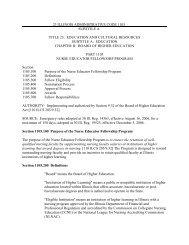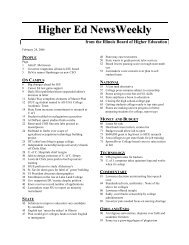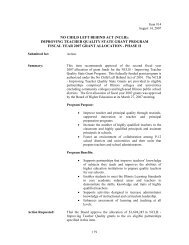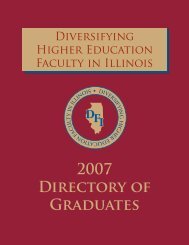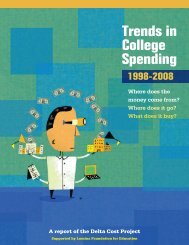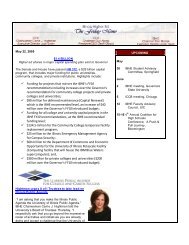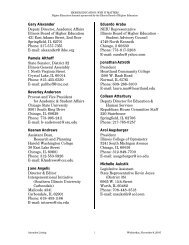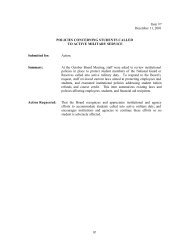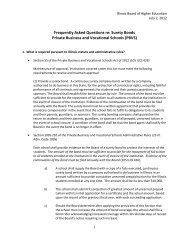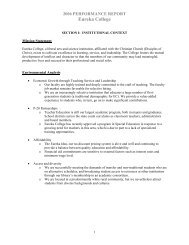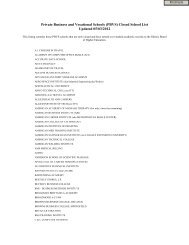A Report on the Feasibility of Textbook Rental - IBHE
A Report on the Feasibility of Textbook Rental - IBHE
A Report on the Feasibility of Textbook Rental - IBHE
Create successful ePaper yourself
Turn your PDF publications into a flip-book with our unique Google optimized e-Paper software.
INTRODUCTIONAcross <strong>the</strong> nati<strong>on</strong>, <strong>the</strong> cost <strong>of</strong> college textbooks is a comm<strong>on</strong> and growing c<strong>on</strong>cern forstudents, parents, legislators, administrators, and faculty members. Students are faced withfinancial c<strong>on</strong>straints that may deter <strong>the</strong>m from purchasing course materials. Parents who pay for<strong>the</strong>ir children’s educati<strong>on</strong> <strong>of</strong>ten experience textbook purchases as “piling <strong>on</strong>” after <strong>the</strong>y have beensacked by tuiti<strong>on</strong>, fee, and room and board payments. Faculty and administrators are faced with<strong>the</strong> pressure <strong>of</strong> providing quality educati<strong>on</strong> while keeping costs down. In many states and at <strong>the</strong>federal level, legislati<strong>on</strong> has been proposed – and in some instances passed; task forces have beenformed; and studies have been undertaken with <strong>the</strong> goal <strong>of</strong> reducing students’ spending <strong>on</strong>textbooks without sacrificing educati<strong>on</strong>al quality or academic freedom.Against this backdrop, <strong>the</strong> Illinois Senate <strong>of</strong> <strong>the</strong> 94 th General Assembly passed SenateResoluti<strong>on</strong> 692 directing <strong>the</strong> Illinois Board <strong>of</strong> Higher Educati<strong>on</strong> (<strong>IBHE</strong>), in c<strong>on</strong>juncti<strong>on</strong> with <strong>the</strong>Illinois Community College Board (ICCB), community colleges and public universities, toc<strong>on</strong>duct a study <strong>of</strong> <strong>the</strong> cost and feasibility <strong>of</strong> implementing textbook rental programs atcommunity colleges and public universities as well as identifying o<strong>the</strong>r textbook cost-savingalternatives. The resoluti<strong>on</strong> required <strong>the</strong> study to examine funding opti<strong>on</strong>s to cover start-up costs,legislati<strong>on</strong> from o<strong>the</strong>r states, <strong>the</strong> ec<strong>on</strong>omic impact <strong>of</strong> rental programs, and cost-saving alternativesto textbook rental programs.This report addresses <strong>the</strong> requirements <strong>of</strong> SR 692. It begins with a survey <strong>of</strong> recentresearch <strong>on</strong> textbook market trends and a summary <strong>of</strong> recent state and federal legislative activitiesregarding textbook costs. Next, it reports <strong>on</strong> existing textbook rental programs in <strong>the</strong> nati<strong>on</strong> andin Illinois. Finally, it reports <strong>on</strong> <strong>the</strong> findings <strong>of</strong> a study c<strong>on</strong>ducted by <strong>the</strong> <strong>IBHE</strong> and ICCB <strong>on</strong> <strong>the</strong>cost and feasibility <strong>of</strong> creating new textbook rental programs in Illinois and <strong>on</strong> potential costsavingalternatives to rental programs.Market IssuesTHE TEXTBOOK MARKETThe salient c<strong>on</strong>siderati<strong>on</strong> in examining <strong>the</strong> textbook market is <strong>the</strong> disjuncture betweenseller and c<strong>on</strong>sumer. During a hearing <strong>of</strong> <strong>the</strong> U.S. Department <strong>of</strong> Educati<strong>on</strong>’s Nati<strong>on</strong>al AdvisoryCommittee <strong>on</strong> Student Financial Assistance (ACSFA) held in September 2006, Dr. James V.Koch, Pr<strong>of</strong>essor <strong>of</strong> Ec<strong>on</strong>omics and President Emeritus <strong>of</strong> Old Domini<strong>on</strong> University, noted: “Thetextbook market is unusual in that <strong>the</strong> primary individuals who choose textbooks (faculty) are not<strong>the</strong> people who pay for <strong>the</strong>m (students).” C<strong>on</strong>sequently, <strong>the</strong> separati<strong>on</strong> between choice andpayment results in price inelasticity, meaning that students have limited ability to resp<strong>on</strong>d toincreasing costs. Dr. Koch noted that studies have found even a 10 percent increase in priceresults in <strong>on</strong>ly a 2 percent drop in sales.C<strong>on</strong>gressman David Wu <strong>of</strong> Oreg<strong>on</strong> made <strong>the</strong> same point when requesting that <strong>the</strong>ACSFA undertake a study <strong>of</strong> textbook costs and cost-saving alternatives. C<strong>on</strong>gressman Wustated that “it’s a classic broken market…<strong>the</strong> pr<strong>of</strong>essor is making <strong>the</strong> decisi<strong>on</strong>, <strong>the</strong> publishers andbookstores are setting <strong>the</strong> prices and <strong>the</strong> student has no choice in <strong>the</strong> product” (Powers 2006).College bookstores are likewise in a unique situati<strong>on</strong>. They have little opportunity toadjust product mix or engage in standard marketing techniques to maximize revenues.-13-



